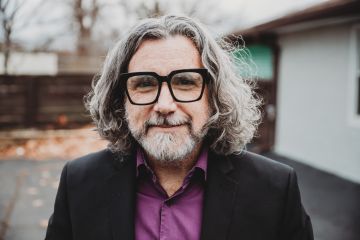Biography

Dr. Peter Hauser
Center for Culture and Language
National Technical Institute for the Deaf
Rochester Institute of Technology
Office 53-2160
One Lomb Memorial Drive
Rochester, NY 14623
Term: 02/01/2024 – 01/30/2027
Dr. Hauser holds a Ph.D. in clinical psychology from Gallaudet University, an M.A. in psychology and M.A. in linguistics from Gallaudet University, a B.A. in psychology and B.A. in philosophy from Central Connecticut State University, and an A.A.S. in behavioral sciences from Northwestern Connecticut Community College. Hauser had a clinical neuropsychology post-doctoral fellowship in the departments of neurology and psychiatry at the University of Rochester before he joined the faculty of Rochester Institute of Technology (RIT) in 2002.
Hauser navigated his higher education and career as a deaf individual who communicated with his peers, teachers, and mentors with access services, primarily American Sign Language (ASL) interpreting. When Hauser began teaching psychology at RIT, about a quarter of his students were deaf or hard of hearing. The experience of teaching deaf and hard-of-hearing students directly using ASL while the non-deaf students adapted to learning with ASL-English interpreters and being as inclusive as possible was a skill he mastered over time. His inclusive teaching made many of his courses a popular choice for deaf and hard-of-hearing students but also for students from backgrounds underrepresented in higher education. As an academic advisor, he immediately identified systematic barriers for deaf and hard-of-hearing students to obtain mentored research experiences on and off campus, a challenge that was not new to him. Since then, he has committed to breaking down systematic barriers and opening doors for deaf and hard of hearing students and junior faculty in STEM disciplines. He has won RIT’s provost award for excellence in teaching, RIT’s online learning award for excellence in online teaching, RIT’s pluralism award for promoting diversity and inclusion, and RIT’s faculty mentoring award.
Early in Hauser’s career, he had a small private practice where he conducted neurocognitive evaluations of deaf children and adults, particularly ASL users, who were referred in order to rule out learning, language, or cognitive disorders. Hauser was frustrated that the assessment instruments available were developed and designed specifically for non-deaf individuals. There was no available research providing evidence of validity when used with deaf or hard of hearing ASL signers. Additionally, knowledge about how the human brain functions is primarily based on brains that have been processing an auditory language, not a visual language. He found the need for empirical research on how deaf people learn more critical than providing clinical services. He closed his practice and focused on his research. In 2006, Hauser joined the research faculty at the National Technical Institute for the Deaf (NTID) at RIT and began studying all aspects of deaf and hard of hearing lives from cultural, biological, and linguistic perspectives. Hauser has made contributions to psychology, cognitive science, linguistics, interpreting, education, and health. In 2020, Deaf Life magazine named Hauser as the Person of the Year recognizing his contributions to the lives of deaf and hard of hearing individuals.
When Hauser joined NTID’s research faculty, he also joined the NSF Science of Learning Center on Visual Language and VIsual Learning (VL2) at Gallaudet University with different roles including the leader of the neurocognitive research and the national science mentorship leader. At VL2, he formalized the mentoring activities he provided informally in the past at RIT. This eventually became the template for the Rochester Bridges to the Doctorate (NIH-NIGMS R25/T32) program that he established at RIT with the University of Rochester School of Medicine and Dentistry to further broaden the participation of deaf and hard of hearing individuals in biomedical sciences. Hauser has also been the PI on NSF awards that seek to broaden the participation of deaf and hard of hearing individuals in sign language research. Recently, Hauser was the Interim Associate Dean of Research at RIT/NTID. Today, Professor Hauser directs the NTID Research Center on Culture and Language and serves on the Advisory Committee to the Director of the National Institutes of Health (NIH), Working Group on Diversity.

